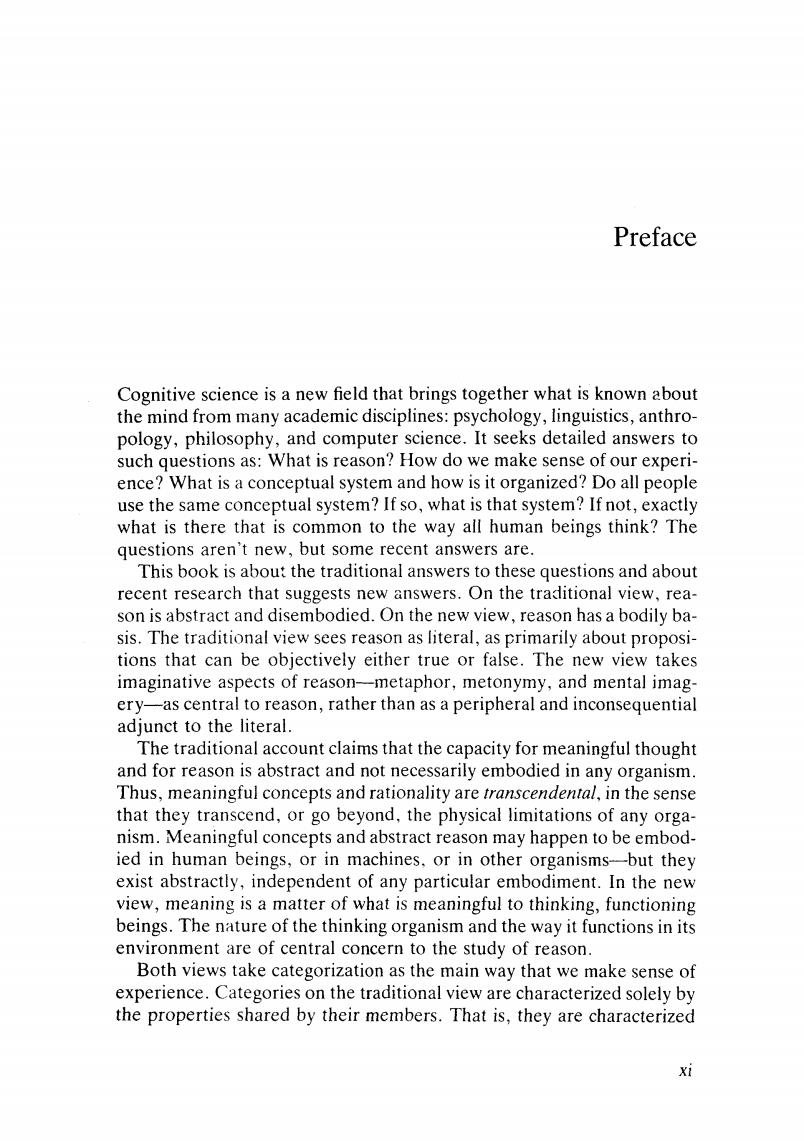正在加载图片...

Preface Cognitive science is a new field that brings together what is known about the mind from many academic disciplines:psychology,linguistics,anthro- pology,philosophy,and computer science.It seeks detailed answers to such questions as:What is reason?How do we make sense of our experi- ence?What is a conceptual system and how is it organized?Do all people use the same conceptual system?If so,what is that system?If not,exactly what is there that is common to the way all human beings think?The questions aren't new,but some recent answers are. This book is about the traditional answers to these questions and about recent research that suggests new answers.On the traditional view,rea- son is abstract and disembodied.On the new view,reason has a bodily ba- sis.The traditional view sees reason as literal,as primarily about proposi- tions that can be objectively either true or false.The new view takes imaginative aspects of reason-metaphor,metonymy,and mental imag- ery-as central to reason,rather than as a peripheral and inconsequential adjunct to the literal. The traditional account claims that the capacity for meaningful thought and for reason is abstract and not necessarily embodied in any organism. Thus,meaningful concepts and rationality are transcendental,in the sense that they transcend,or go beyond,the physical limitations of any orga- nism.Meaningful concepts and abstract reason may happen to be embod- ied in human beings,or in machines,or in other organisms-but they exist abstractly,independent of any particular embodiment.In the new view,meaning is a matter of what is meaningful to thinking,functioning beings.The nature of the thinking organism and the way it functions in its environment are of central concern to the study of reason. Both views take categorization as the main way that we make sense of experience.Categories on the traditional view are characterized solely by the properties shared by their members.That is,they are characterized xiPreface Cognitive science is a new field that brings together what is known cbout the mind from many academic disciplines: psychology, linguistics, anthropology, philosophy, and computer science. It seeks detailed answers to such questions as: What is reason? How do we make sense of our experience? What is a conceptual system and how is it organized? Do all people use the same conceptual system? Ifso, what is that system? If not, exactly what is there that is common to the way all human beings think? The questions aren't new, but some recent answers are. This book is abou~ the traditional answers to these questions and about recent research that suggests new answers. On the traditional view, reason is abstract and disembodied. On the new view, reason has a bodily basis. The traditional view sees reason as literal, as primarily about propositions that can be objectively either true or false. The new view takes imaginative aspects of reason-metaphor, metonymy, and mental imagery-as central to reason, rather than as a peripheral and inconsequential adjunct to the literal. The traditional account claims that the capacity for meaningful thought and for reason is abstract and not necessarily embodied in any organism. Thus, meaningful concepts and rationality are transcendental, in the sense that they transcend, or go beyond, the physical limitations of any organism. Meaningful concepts and abstract reason may happen to be embodied in human beings, or in machines, or in other organisms-but they exist abstractly, independent of any particular embodiment. In the new view, meaning is a matter of what is meaningful to thinking, functioning beings. The nature of the thinking organism and the way it functions in its environment are of central concern to the study of reason. Both views take categorization as the main way that we make sense of experience. Categories on the traditional view are characterized solely by the properties shared by their members. That is, they are characterized Xl